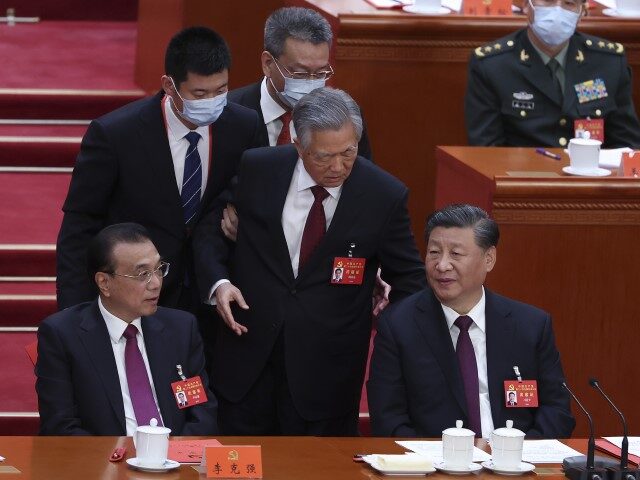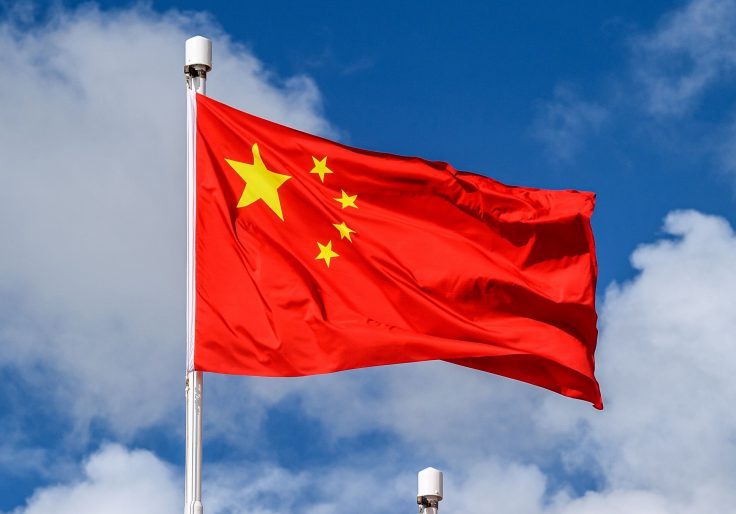The man now widely believed to be Peng Lifa reportedly disguised himself as a construction worker to get atop Beijing’s Sitong Bridge and hang up two banners — one reading, “No PCR tests, but food; no lockdowns, but freedom; no lies, but respect; no Cultural Revolution, but reform; no dictator, but vote; no [to being] slaves, but we the people” and another reading “students strike — workers strike — people strike — dictator traitor Xi Jinping.”
Elderly Chinese Ex-President Hu Jintao Hauled Out of Communist Event as Xi Jinping Watches

The Chinese Communist Party Congress, an event occurring every five years to appoint Party leaders and determine future priorities, ended with a dramatic climax on Saturday in which two officers appeared to manhandle and expel 79-year-old former President Hu Jintao from his seat, clearly against his will.
Hu served as president and chairman of the Communist Party prior to current dictator Xi Jinping, who assumed an unprecedented third term at the helm of the country on Saturday following a vote by the communist elite. The vote occurred shortly after the very physical removal of an apparently frail Hu, who was seated less than one foot from Xi and appeared to plead for the dictator to intervene and prevent his expulsion, to no avail.
Hu’s tenure was largely marked by his failure to assert himself as national dictator or a major influential personality in the Party, even as leader. It is also notable in that it ended voluntarily, after Hu chose to step down and allow then-Vice President Xi to take over in 2013. At the time, Xi applauded him for his “deep consideration toward the development of the Party, the country and military” and “noble character” in resigning.
Video captured by Agence France-Presse (AFP) on Saturday morning Beijing time showed two men abruptly approach Hu, who had not behaved in any apparent disruptive way prior to the incident, and take away his official paperwork. The men then begin grabbing Hu under his arms and dragging him away. Hu appears to try to take Xi’s papers, as the dictator is seated beside him, but Xi holds his papers down. Xi and Premier Li Keqiang, seated next to Xi, appear to calmly nod in Hu’s direction as he is dragged away wearing an expression of fear.
Adding to the intrigue is an apparent attempt by Party official Li Zhanshu, seated on the other side of Hu, to stand up and help him as the men begin grabbing him, but Xi ally Wang Huning grabs his arm and discourages him from intervening.
The men dragging Hu away do not appear to be mere security guards, as they are wearing Party name tags. Online observers identified one of the men as a top Communist Party official, Kong Shaoxun.
The Communist Party has not yet, at press time, explained what happened to necessitate Hu’s removal, which many international observers have described as shocking and humiliating for the elderly former president. Adding to suspicions that he may have been preparing to vote against a third term for Xi as chairman of the Party is the fact that the Chinese government moved rapidly to censor any mentions of Hu or the incident at the Party congress on Weibo, the state-controlled social media site.
“Search results for ‘Hu Jintao’ on China’s Twitter-like platform Weibo appeared to be heavily censored Saturday afternoon, with the most recent result dated Friday and posts limited to those of official accounts,” AFP observed.
The state-run propaganda outlet Global Times published an extensive, glowing report on Saturday’s Congress session that entirely omitted any mention of Hu Jintao, focusing instead on Xi’s supremacy within the Party.
“The week-long 20th National Congress of the Communist Party of China (CPC) successfully concluded on Saturday in Beijing, and it noted that the establishment of Comrade Xi Jinping’s core position on the Party Central Committee and in the Party as a whole,” the Global Times reported, “and the guiding role of Xi Jinping Thought on Socialism with Chinese Characteristics for a New Era has set the rejuvenation of the Chinese nation on ‘an irreversible historical course.'”
The newspaper did not note that any single member of the Party objected to Xi’s permanence in power, claiming that his “re-election” “required all Party members to acquire a deep understanding of the decisive significance of this major achievement, more conscientiously uphold Comrade Xi Jinping’s core position … and uphold the Central Committee’s authority and its centralized, unified leadership.”
No Communist Party Congress coverage in the Global Times mentioned Hu at all this week, despite his presence at the opening event along with a host of other retired officials.
The Xinhua News Agency, another official Chinese government outlet, published photos from Saturday of Hu seated alongside Xi Jinping. It also published an explanation of the events on Twitter – a social media outlet Chinese citizens who are not high-ranking Party officials cannot access.
Xinhua claimed that Hu “insisted on attending the closing session” despite needing to “recuperate” and that he “was not feeling well” when two men violently ousted him from the event.
“Now he is much better,” the government mouthpiece claimed.
Foreign Policy‘s James Palmer observed that Hu is nearly the last of his cohort in the Party, as Xi Jinping’s routine purges of those he does not consider loyalists have imprisoned or otherwise silenced nearly all of Hu’s allies.
“Many of his former allies have been arrested in Xi’s purges, most notably his chief aide Ling Jihua in 2015,” Palmer wrote. “Hu was associated with a power network of former leaders, like himself, of the Communist Youth League; that faction appears to have been effectively destroyed.”
He speculated that a variety of possibilities could have resulted in the strange incident – from Hu indeed suffering a health incident or a dementia-fueled episode to the chance that “information suddenly came up that made Xi — who would have had to personally approve any such move — afraid that Hu might abstain or even vote against him in the rounds of otherwise unanimous voting that finished off the Party Congress.”
“That could have been a remark by Hu to his former colleagues backstage or perhaps even signs of dementia that caused a sudden panic that something might go wrong. That would make Hu’s confusion understandable,” Palmer mused.
Yet prior incidents of elderly Party members embarrassing themselves, or Xi, have occurred largely without punishment. During the last Party Congress in 2017, Jiang Zemin, the president who preceded Hu, spent most of Xi Jinping’s three-hour speech yawning, sleeping, checking his watch, and reading, clear signs of disrespect. Jiang was 91 at the time and became a sensation on Chinese regime-controlled social media outlets with only minimal censorship.
Currently 96, Jiang did not attend this year’s Congress, though few questioned his absence.
Feds Charge 7 Chinese Nationals Over Plot to Repatriate U.S. Resident to China
Eight-count indictment is latest case by Justice Department targeting Beijing's expatriation campaign in U.S.

By Sarah N. Lynch
WASHINGTON (Reuters)—The United States unsealed criminal charges on Thursday against seven Chinese nationals accused of waging a surveillance and harassment campaign against a U.S. resident and his family, in a bid by the Chinese government to repatriate one of them back to China.
The eight-count indictment, unsealed in a U.S. District Court in Brooklyn, New York, is the latest case by the Justice Department targeting China's apparent expatriation campaign, known as "Operation Fox Hunt."
The seven individuals charged are Quanzhong An, 55, of Roslyn, New York his daughter Guangyang An, 34, and five others still in China: Tian Peng, Chenghua Chen, Chunde Ming, Xuexin Hou, and Weidong Yuan.
The lead defendant, Quanzhong An, and his daughter were arrested on Thursday morning. The rest of the defendants remain at large. The United States does not have an extradition treaty with China.
According to the indictment, Quanzhong An is accused of working at the behest of China's Provincial Commission for Discipline Inspection to harass and intimidate a Chinese man and his son living in the United States. The man and his son are identified only as "John Doe-1 and John Doe-2."
As part of the plot, the defendants allegedly coerced a relative of the family to travel from China to the United States in a bid to convince John Doe-1 to return to the country.
At a meeting in a restaurant in Sept. 2018, the relative explained to John Doe-2 that he had been forced to travel there by the government as part of a plan to repatriate the 100 most-wanted fugitives, the indictment said.
Other examples of harassment the family endured included a letter-writing campaign, with one letter warning that "coming back and turning yourself in is the only way out."
The Chinese government also filed a lawsuit against the father and son in a New York state court, claiming the father had stolen money from a Chinese employer and his son illegally profited from the scheme.
"The victims in this case sought to flee an authoritarian government, leaving behind their lives and family, for a better life here. That same government sent agents to the United States to harass, threaten, and forcibly return them to the People's Republic of China," said Michael Driscoll, the FBI's assistant director in charge in the New York office.
(Reporting by Sarah N. Lynch; Editing by Bill Berkrot)
No comments:
Post a Comment